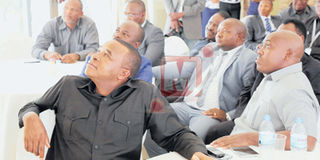Acacia says row a risk to the economy

Former Minister of Energy and Minerals William Ngeleja (left) and other MPs follow President John Magufuli’s second report speech on minerals at State House in Dar es Salaam on Monday. PHOTO | EMMANUEL HERMAN
What you need to know:
- In a statement yesterday, the company, which is going through one of its toughest tests following the ban on exports of its mineral ore, says such a decision will impact negatively on both parties.
- The company maintained that it had done nothing wrong in Tanzania and maintained that an independent probe be carried out to corroborate incriminating findings of the two presidential committees that investigated how the company was conducting its affairs.
Dar es Salaam. Acacia Mining Company has reiterated the call to amicably end the dispute with the government, cautioning that a prolonged standoff may not be to the country’s economic interests.
In a statement yesterday, the company, which is going through one of its toughest tests following the ban on exports of its mineral ore, says such a decision will impact negatively on both parties.
The company maintained that it had done nothing wrong in Tanzania and maintained that an independent probe be carried out to corroborate incriminating findings of the two presidential committees that investigated how the company was conducting its affairs.
“The continuation of the export ban will not only hurt Acacia’s ability to conduct future business in the country, but will also directly and negatively affect the lives of thousands of Tanzanians,” said Acacia, a day after President Magufuli received the second report. Dr Magufuli’s decision is likely to cripple mining activities at the company’s Buzwagi, Bulyankhulu and North Mara mines.
Speaking on Monday after receiving the report of the team he formed to probe legal and economic impact of the company’s mining on the country, Dr Magufuli said no mineral ore would be exported unless Acacia paid tax and royalty arrears running into trillions of shillings since 1998.
The President also banned exports of gold bars directly from mine operated airports without state organs’ inspection. The government last week proposed in the budget a one-per cent clearance tax on gold exports.
Acacia is disputing all findings of the two committees and says it will be ready to dialogue with the government to find a lasting solution, which is fair to both parties to the mining dispute.
“The security of the 36,200 indirect and induced jobs that rely on Acacia’s mining operations and the company’s ability to invest in education, infrastructure and health projects will all be under threat,” it said.
As a company, it argued, it has been committed to acting responsibly as required of a foreign company investing in Tanzania. “Foreign investment and the private sector play an important role in the economic advancement of Tanzania and we ask that the people of Tanzania’s economic future is not put at risk,” said Acacia.
President Magufuli has adopted a hard stance on the company and the two reports show that it has been cheating on mineral exports and tax evasion over the years. Acacia is also accused of operating illegally in the country. The second committee reported that the company was not registered as a business entity in Tanzania, a claim that the company formerly trading as Africa Barrick Gold has refuted.
The raft of recommendations by the two committees have been approved by President Magufuli and broad cross-section of the Tanzania citizenry, who have rallied behind their leader to push for a better deal .




